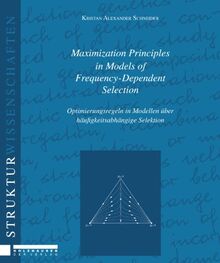
Population genetics is a branch of genetics concerned with the study of the genetic composition of natural populations. Genetic factors such as segregation, recombination, mutation, or mating structure as well as environmental or behavioral factors change the genetic composition of a population. By incorporating the fundamental rules of the underlying genetic structure and the environmental factors, population genetics seeks to clarify the mechanisms of evolution. Population genetics is tightly linked to both the theory of natural selection and the mechanisms of inheritance, which by most scientists were erroneously believed to be incompatible until the second decade of the twentieth century.
We will draw our attention to models of frequency-dependent selection, a form of selection that occurs if the fi tness ('probability that an offspring survives until the age of reproduction') of a particular phenotype depends on the frequency of its own and other phenotypes in the population. In four chapters we encounter several aspects of models of frequencydependent selection, which subsume various biological situations. Especially, we will focus on establishing general principles that allow us to recognize evolution as a process of 'optimization'.